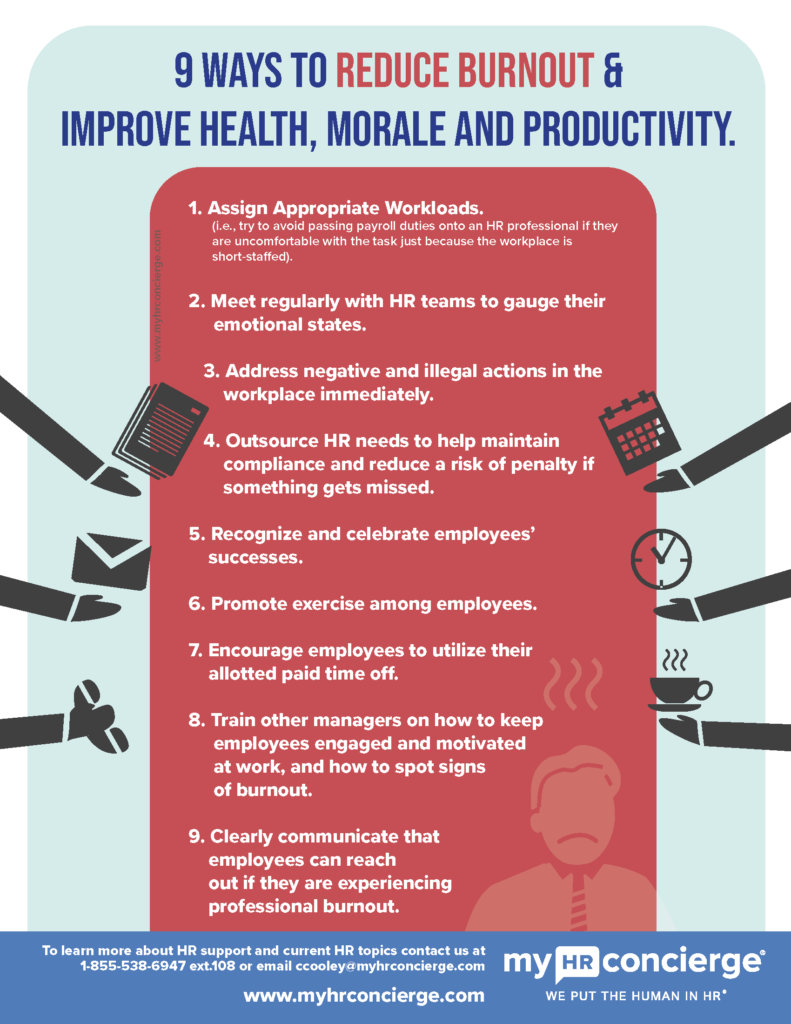Protecting HR Teams From Burnout
Last Updated on July 12, 2021
Burnout is a commonly discussed issue these days—particularly while many workforces are still working from home amid the COVID-19 pandemic. Being isolated, stressed and overworked puts employees in a difficult position and can lead to increased burnout. Oftentimes, it’s HR’s responsibility to help employees cope with burnout and its contributing factors.
However, in many cases, that leaves HR teams without lifelines of their own and with the lingering effects of the pandemic that can lead to increased stress and burnout. Some areas that are putting additional stress on HR departments include:
- New federal laws in response to the pandemic
- hiring and re-staffing
- remote work accommodations,
- paid time off,
- gender identity awareness
- overall equality and prevention of discrimination
When HR is burned out, who can they turn to? That’s a fundamental question for employers and HR leaders to consider. Without safeguards in place, burnout can disrupt an organization from the inside out, starting with HR teams.
Finding additional HR support for these areas can help relieve the burden on HR persons and also become valuable resources in some of these trying times. MyHRConcierge offers products such as HR Basic, HRCompli, and HRCompli+Admin, Manager’s Tipline, that can be used to provide customized assistance.
We dig deeper into burnout and explain how HR teams can take steps to stay afloat when feeling overburdened.
Defining Professional Burnout.
Burnout, in simple terms, is the feeling of mental exhaustion stemming from workplace duties. According to the World Health Organization, burnout may be shown through the following symptoms:
• Fatigue or energy depletion
• Decreased engagement at work, or feelings of negativism or cynicism related to one’s job
• Reduced productivity or efficacy
However, burnout can be seen through more subtle behaviors, too, such as:
• Mood swings
• Uncharacteristic sensitivity
• Working more than usual
• Decreased socialization
• Increased time away from work
As these examples show, burnout doesn’t always look the same for everyone. Yet, the impacts of burnout are typically uniform—lower-quality work and detrimental health effects.
Why Is Burnout Important to Combat?
For some employees, the negative effects of burnout extend beyond their work lives and into their home and social lives. In other words, burnout could stem from work duties, personal life responsibilities or a combination of the two. This means it’s important for employers to prevent burnout where they can (the workplace) and help reduce its overall impact on employees.
Moreover, burnout can increase an employee’s risk of getting sick or developing a chronic condition. This can lead to more time away from work, lower productivity, increased workplace resentment, and other negative qualities.
How to Prevent Burnout
Since burnout is usually the result of prolonged and chronic workplace stress, it’s important to know how to recognize workplace stressors.
While it may not be possible to eliminate job stress altogether for employees, HR leaders can help their teams learn how to manage it effectively. Common job stressors include a heavy workload, intense pressure to perform at high levels, job insecurity, long work hours, excessive travel, office politics and conflicts with co-workers.
For HR teams, stressors may also include dealing with a greater number of employee issues, handling tasks that aren’t typically within their purview, and complying with fluctuating workplace regulations.
HR Leaders Can Help Reduce Burnout
HR leaders can implement various activities to help reduce their teams’ stress—and, in turn, burnout—which can improve health, morale, and productivity. Below are action steps for managers to consider when dealing with HR burnout:
• Make sure that workloads are appropriate for the individual, in both quantity and type of work (i.e., try to avoid passing payroll duties onto an HR professional if they are uncomfortable with the task just because the workplace is short-staffed).
• Meet regularly with HR teams to gauge their emotional states and pare down work duties as needed.
• Address negative and illegal actions in the workplace immediately. Do not tolerate bullying, discrimination, or any other similar behaviors, as this can also lead to negative workplace emotions and burnout.
• Outsource HR needs to help maintain compliance and reduce a risk of penalty if something gets missed while helping with the workload
• Recognize and celebrate employees’ successes. This contributes to improved morale and decreased stress levels.
• Promote exercise among employees, as it’s a proven stress reliever.
• Encourage employees to utilize their allotted paid time off.
• Train other managers on how to keep employees engaged and motivated at work, and how to spot signs of burnout. This is especially important given that some employees may hide their burnout symptoms to avoid potential retaliation.
• Clearly communicate that employees should reach out if they are experiencing burnout, and that there will be no punishment for seeking help.
HR leaders should also be ready to adapt these actions to conform to the unique needs of their teams. If some tactics aren’t working to reduce burnout, restrategize and try new ones.
Employers Should Take Employee Burnout Seriously.
Burnout is a serious condition that can disrupt an entire organization. This is especially true when HR teams become afflicted and can no longer adequately assist other employees with their problems. That can create a snowball effect where employees have nowhere to turn for timely assistance.
For detailed questions about employee screening, let MyHRScreens help. Contact klewis@myhrscreens.com today to ask questions or set up an appointment.
For more information regarding COVID/HR policies during the COVID-19 crisis or assistance with other HR needs, contact MyHRConcierge at 1-855-538-6947 x.108 or email ccooley@myhrconcierge.com.


